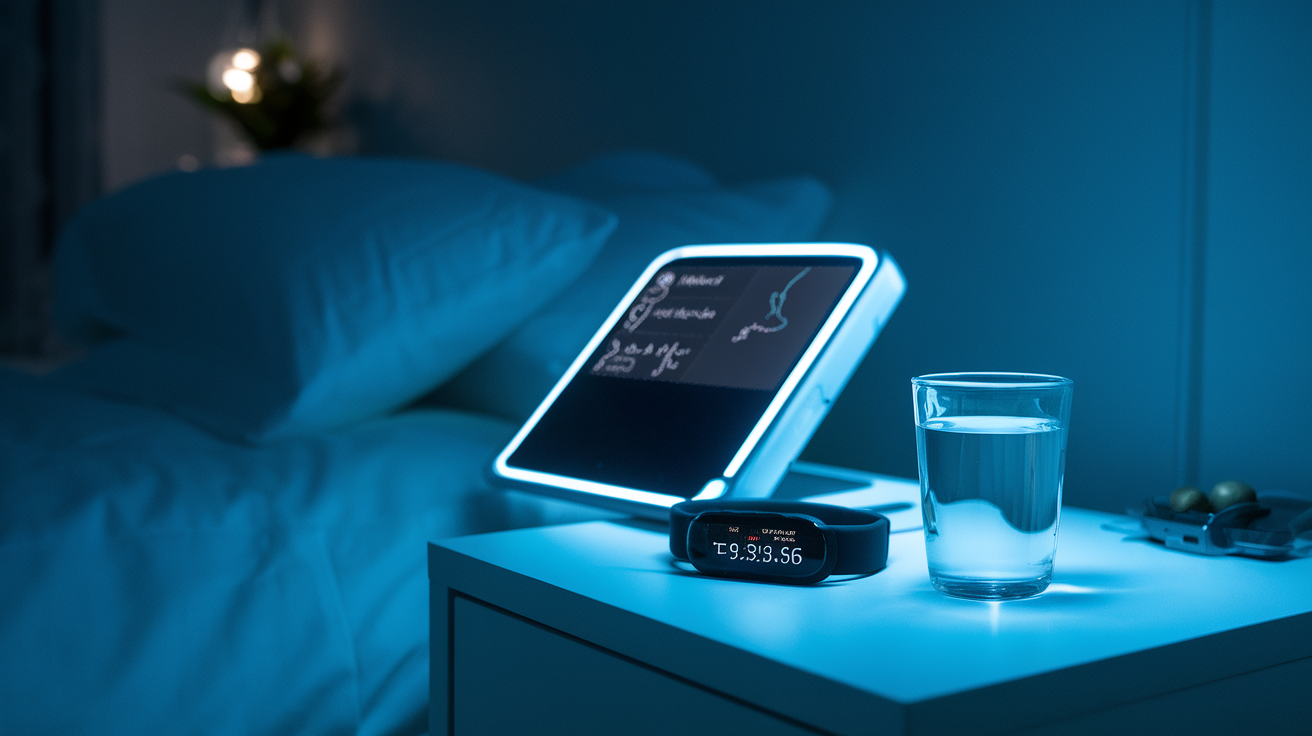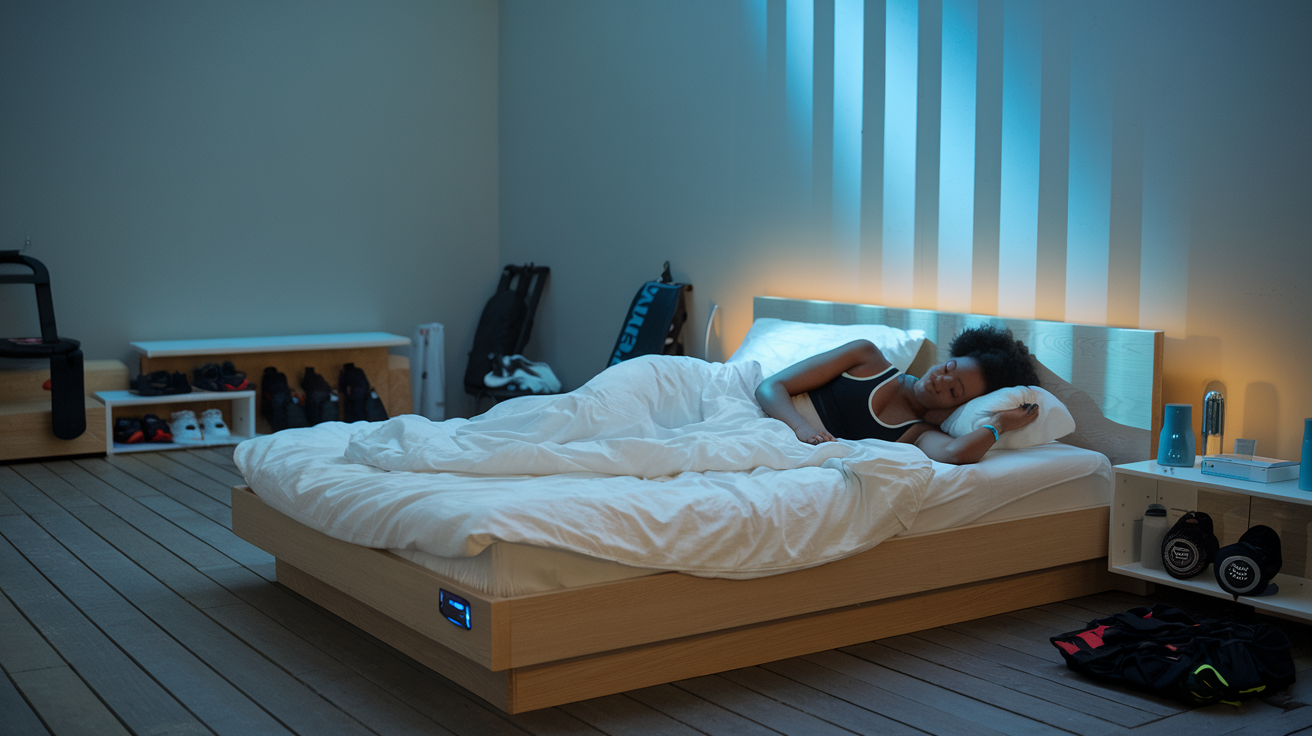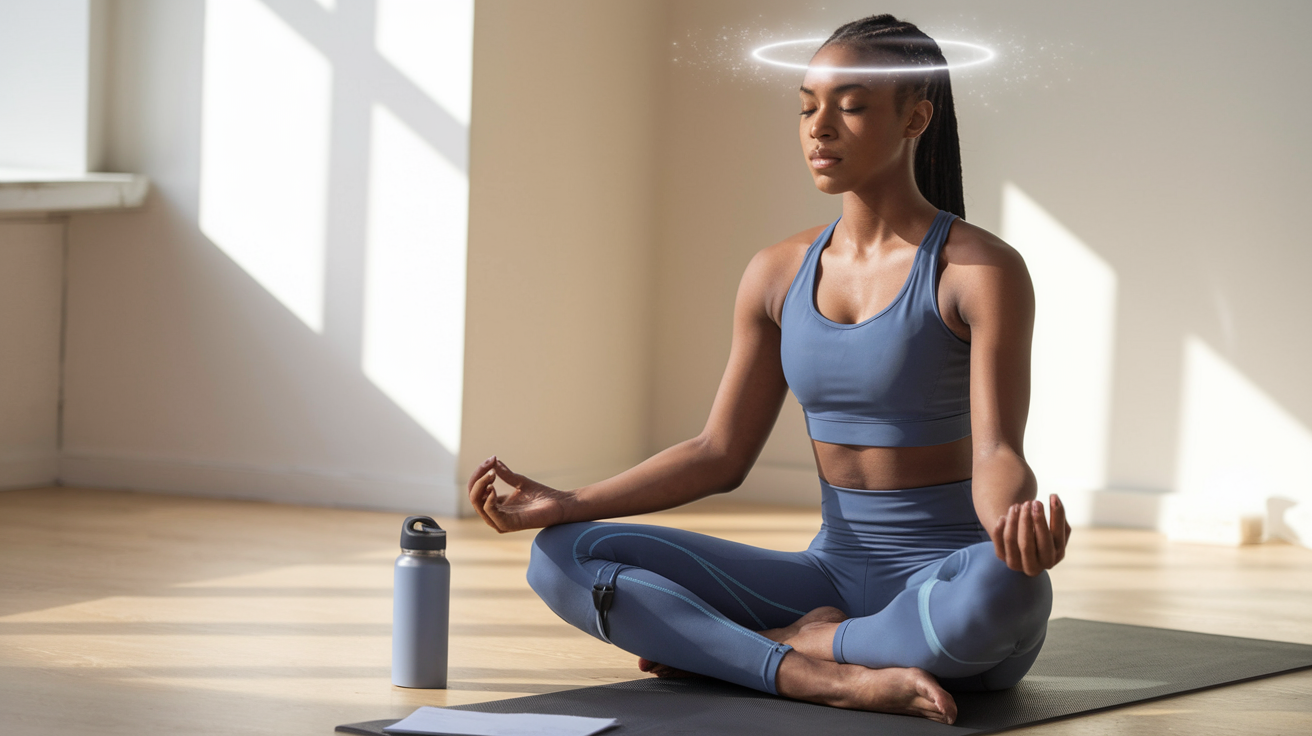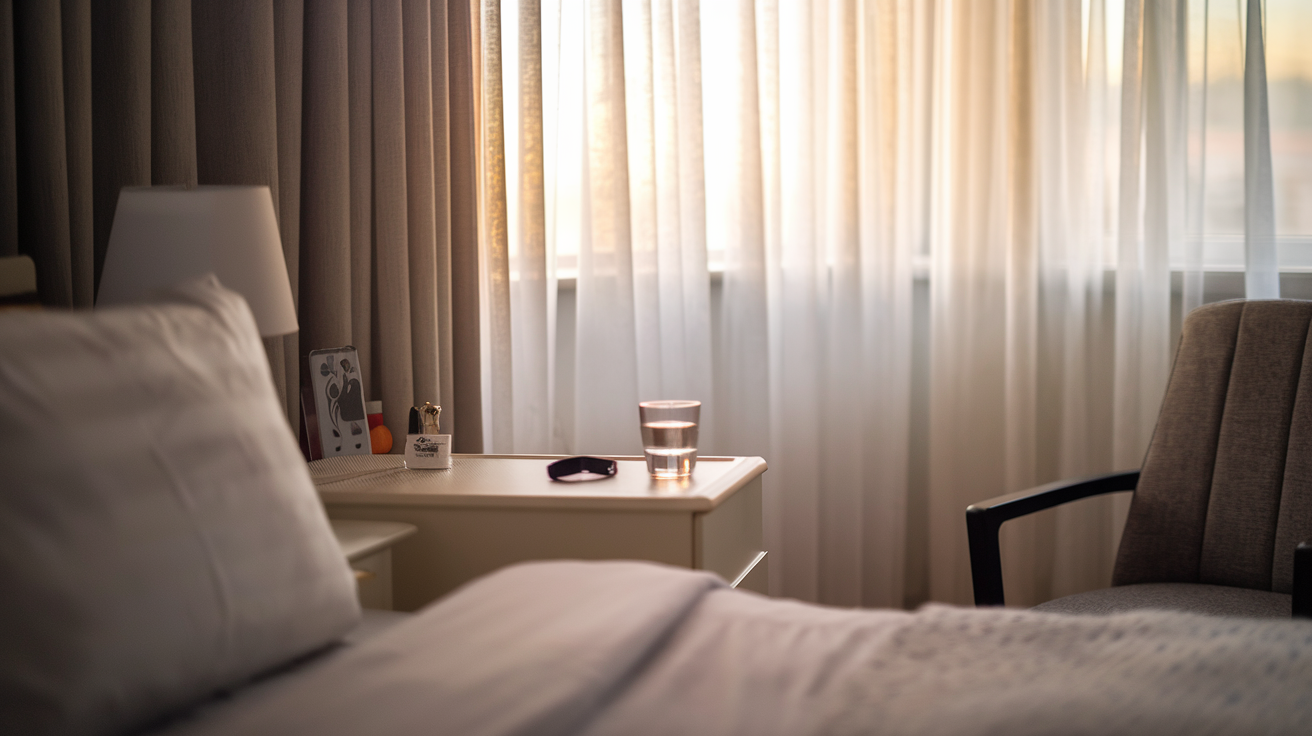You’ve tried every fitness regimen on Instagram and spent hundreds on pricey supplements, but you’re still not able to meet your fitness objectives. Instead, find out what 87% of top athletes rely on. Go to sleep.
Yes, exactly. The best performance enhancer is waiting for you on your bed for free; it’s not in a fancy bottle.
The key to successful weight loss and muscle growth is getting enough sleep, something that most fitness enthusiasts totally ignore. No protein shake can replicate the complex repair process your body undergoes when you fall asleep.
What your favorite fitness influencer isn’t telling you, though, is that sleep and physical performance are related.
Table of Contents
The Science Behind Sleep and Physical Performance

How Sleep Cycles Affect Muscle Recovery and Growth
Have you ever observed the enhanced quality of your workouts following a restful night’s sleep? This is no coincidence. Your body goes into repair mode while you sleep, especially when your growth hormone levels are at their highest during deep sleep. In essence, your body uses this hormone as a natural supplement to build muscle.
Every 90 minutes, your sleep cycle progresses through four phases, including REM sleep. The magic occurs during the third and fourth stages of deep sleep. Your muscles receive more blood flow at that point, which provides the oxygen and nutrients they need to heal the tiny tears caused by your workout.
The figures are honest. According to studies, athletes who get enough sleep recover up to 30% faster and see notable increases in muscle protein synthesis, which is the process that actually makes muscles stronger.
You’re effectively undoing some of the progress you’ve made at the gym if you don’t get enough sleep.
Sleep Deprivation’s Impact on Athletic Performance
When you don’t get enough sleep, your performance suffers. I’m not referring to simply feeling a little lethargic, either.
Basketball players who slept for 10 hours increased their sprint times by 5% and their shooting accuracy by an astounding 9%, according to Stanford University research. Meanwhile, athletes who don’t get enough sleep exhibit:
- Reduced response time (by as much as 300%)
- Athletes who don’t get enough sleep also exhibit decreased endurance, with their time to exhaustion decreasing by 17 percent.
- impaired metabolism of glucose
- Increased rates of injuries (1.7 times more likely)
- compromised judgement
When you don’t get enough sleep, your performance suffers and your muscles don’t recover properly. While your actual output decreases, your perceived exertion increases dramatically. This is the worst combination imaginable: working out feels harder but yields fewer results.
The Optimal Sleep Duration for Active Individuals
Where do fitness enthusiasts find the optimal balance? It’s not the typical eight hours that most people discuss.
Active people usually require seven to nine hours, but the worst part is that you may require up to ten hours if you’re training hard or picking up new skills. During periods of intense training, elite athletes typically get 9–10 hours of sleep.
Your individual sleep needs are determined by
:
| Training Factor | Sleep Needs |
|---|---|
| Light exercise (30 min, 3-4x/week) | 7-8 hours |
| Moderate training (60 min, 4-5x/week) | 8-9 hours |
| Intense training/competition | 9-10 hours |
| Recovery from injury | Additional 1-2 hours |
For two weeks, record how well you sleep and how well you work out. Take note of trends. You hit PRs when? When do you feel your best? Your individual sleep sweet spot will be revealed by the data.
Quality vs. Quantity: Why Deep Sleep Matters Most
Seven hours of healthy, deep sleep will help you make more progress than ten hours of snoozing.
70% of your body’s daily growth hormone release occurs during deep sleep, also known as slow-wave sleep. Reaching those restorative stages on a regular basis is more important than simply closing your eyes.
Poor sleep quality manifests as:
- Frequently waking
- Reduced duration of deep sleep phases
- Increased cortisol, which causes muscle breakdown
- Recovery procedures that are disrupted
Measurable variations in strength gains—up to 20–30% in certain studies—can result from the quality of sleep.
Your task is to give sleep hygiene top priority. This calls for regular bedtimes, a completely dark bedroom, a temperature between 65 and 68°F, and a reduction in screen time before bed. To preserve their quality of sleep while traveling, many top athletes even bring white noise generators and blackout curtains.
You can use a sleep tracker to determine whether you’re getting enough deep sleep, which should account for 20–25% of your total sleep time. If you’re not meeting your goals, even minor changes to your sleeping environment can have a significant impact on how well you recover and perform later.
Sleep’s Role in Weight Management and Metabolism

How Sleep Regulates Hunger Hormones
Have you ever noticed that after a terrible night’s sleep, you’re extremely hungry? You’re not thinking that.
When you don’t get enough sleep, your body’s two vital hormones, ghrelin (the “I’m hungry” signal) and leptin (the “I’m full” signal), become erratic. This hormonal concoction makes overeating possible.
In one startling study, participants who slept for only 4 hours had a 28% increase in ghrelin and a 15% decrease in leptin when compared to those who slept for 8 hours. Interpretation? When you don’t get enough sleep, your body literally rewires itself to feel more hungry.
The Connection Between Sleep Deprivation and Increased Cravings
Lack of sleep causes you to crave all the wrong things in addition to making you hungry.
While your prefrontal cortex, which makes decisions, becomes inactive, your sleep-deprived brain’s reward centers become more active. This brain change explains why, after a restless night, you find yourself compelled to indulge in that doughnut.
According to studies, people who don’t get enough sleep consume more than 300 extra calories a day on average, the majority of which come from foods high in fat and carbohydrates. The neurochemical cascade set off by inadequate sleep is simply too strong for your willpower to overcome.
Sleep’s Effect on Insulin Sensitivity and Fat Storage
Your metabolism works against you when you don’t get enough sleep.
Insulin sensitivity can decline by 25% after just one sleepless night, simulating pre-diabetic conditions. Your body finds it difficult to properly process carbohydrates when you are insulin resistant, storing more as fat rather than using them as fuel.
The efficiency of your fat cells also declines. Lack of sleep changes the way your body stores fat, giving preference to deep visceral fat—the hazardous type that surrounds organs—over subcutaneous fat.
Why Poor Sleep May Sabotage Your Calorie Deficit
Are you going to the gym but not getting enough sleep? You’re hurting yourself.
Lack of sleep has subtle effects on how much energy you use. Because you can’t push as hard when exercising, you may burn fewer calories. Additionally, research indicates that people who are sleep deprived experience a 20% decrease in spontaneous movement throughout the day.
Even worse, your body preferentially burns lean muscle mass while preserving fat stores when you are sleep deprived and experiencing a calorie deficit. In one cruel study, those on the same diet lost 60% more muscle and 55% less fat when they didn’t get enough sleep.
The math is straightforward: if you want to lose weight, you cannot compromise on getting 7-9 hours of good sleep.
Recovery Champions: How Sleep Supercharges Your Body

A. Sleep’s role in reducing inflammation and exercise-induced damage
Have you ever experienced a jarring wake-up after a strenuous workout? It’s inflammation speaking. Although inflammation is your body’s normal reaction to the microscopic tears in your muscle fibers, too much of it can throw off your fitness goals.
The worst part is that sleep is your body’s anti-inflammatory superhero. Your body releases cytokines that fight inflammation and repair damaged tissues during those valuable hours of sleep. You’re basically leaving your wounds open if you don’t get enough sleep.
According to studies, a single night of sleep deprivation can raise inflammatory markers by as much as 40%. That would be equivalent to purposefully staying achy and sore for longer than is necessary. Thank you, but no!
B. How quality sleep accelerates post-workout healing
Consider sleep as the night shift for your body’s repair team. That team is repairing tiny tears in your muscles, recharging your energy reserves, and eliminating waste products from your metabolism while you sleep.
Your muscles receive more blood flow during deep sleep stages, which provides the oxygen and nutrients required for repair. Your body temperature drops, your breathing deepens, and your heart rate slows, creating the ideal conditions for healing.
Getting 7 to 9 hours of good sleep leads to quicker recovery, more effective workouts, and better outcomes.
One athlete I worked with saw a nearly 30% reduction in recovery time after increasing her sleep from 6 to 8 hours per night. That’s an additional training day each week!
C. Sleep as the prime time for muscle protein synthesis
Are you curious about the peak times for muscle growth? It’s when you’re dreaming about winning that marathon, not when you’re working out.
Human growth hormone (HGH) production peaks while you sleep, especially during deep sleep phases. This hormone regulates the process of creating larger, more powerful muscles, known as muscle protein synthesis.
The following figures provide compelling evidence:
- Deep sleep accounts for 60–70% of the daily release of HGH.
- Testosterone levels can decline by 10% to 15% after just two sleepless nights.
- Sleep deprivation can cause the rate of muscle protein synthesis to decrease by as much as 18%.
Is your expensive protein powder worth it? If you’re not supporting it with good sleep, it’s a waste.
D. Recovery techniques that enhance sleep quality
Not all sleep is equal. Here’s how to supercharge your sleep for maximum recovery:
Create a sleep sanctuary—establish a peaceful, cool (65–68°F), and dark sleeping environment. Your new best friend is blackout curtains.
Digital sunset—Melatonin production is inhibited by the blue light from screens. 60 minutes before going to bed, put your phone away.
Post-workout timing—High-intensity exercise causes stress hormones and an increase in body temperature. Aim to complete your workouts two to three hours before going to bed.
Recovery tools—contrast therapy, compression clothing, and foam rolling—can all increase blood flow and get your body ready for deep, restful sleep.
Sleep-promoting nutrients—casein protein before bed, foods high in magnesium, and tart cherry juice—can all improve recuperation while you sleep.
E. The connection between sleep and reduced injury risk
It’s not enjoyable to play the injury game. Sleep may serve as your most effective form of insurance.
Athletes who slept for less than six hours had a 1.7-fold higher risk of injury than those who slept for eight or more, according to research from the University of California. The explanations are rather simple:
Lack of sleep impairs judgment and reaction time.
Exhausted muscles fail to contract correctly, causing tendons and ligaments to be overworked.
Sleep deprivation affects coordination and balance.
Long-term sleep deprivation impairs tissue repair and bone formation.
I’ve witnessed innumerable fitness endeavors ruined by avoidable injuries. The pattern is nearly always the same: undersleeping and overtraining.
Before it screams, your body whispers. You know those little aches that appear when you don’t get enough sleep? They are indicators. Pay attention to them or get ready for later, longer, forced recovery periods.
Mental Performance Benefits for Fitness Success

Sleep’s impact on motivation and workout consistency
Have you ever noticed how you want to skip the gym after a terrible night’s sleep? It’s more than just your laziness.
You lose motivation more quickly than a dead phone battery when your brain doesn’t get enough sleep. According to research, your brain’s reward centers—the areas that get excited about working out—become noticeably less responsive after just one night of sleep deprivation.
Sleep deprivation increases the likelihood of skipping scheduled workouts by 27%, according to the science. Furthermore, it creates a detrimental cycle. Sleep worse, miss workouts, feel awful, and miss sleep.
You are not necessarily more disciplined than those who are achieving their fitness goals. Most likely, they’re simply getting better sleep. Better sleepers maintain their exercise regimens for 3.4 times longer than those with worse sleep. This is a result of their brain chemistry, not willpower.
How proper rest improves focus during high-intensity training
When you’re barely getting five hours of sleep, try performing a challenging HIIT routine. Rest assured, it won’t be effective.
Nothing improves mental focus more than sleep. Your brain restructures neural pathways and eliminates metabolic waste while you sleep deeply. This functionality is essential for more than just keeping track of your shopping list.
- Keeping the right form when performing intricate movements
- During interval training, making snap decisions
- Keeping an eye on the present rather than the clock
During technical exercises, athletes who get 8 or more hours of sleep have 12% faster reaction times and 37% fewer errors. That’s what separates a successful workout from a possible injury.
Sleep quality and its effect on willpower for nutritional choices
Have you ever wondered why, when you’re exhausted, your plans to prepare meals fall through? Your brain is literally rewiring itself to crave junk food because you aren’t getting enough sleep.
Lack of sleep causes your body to produce more ghrelin, the hunger hormone, and less leptin, the hormone that signals when you’re full. However, things worsen. According to MRI research, when you see pictures of high-calorie foods while you’re exhausted, your brain lights up like a Christmas tree.
The disparity is striking:
- People who get enough sleep are able to avoid impulsive foods roughly 75% of the time.
- People who don’t get enough sleep give in to cravings about 65% of the time.
It has nothing to do with a lack of discipline. When you’re exhausted, your brain literally takes over how you make decisions.
The relationship between sleep and perceived exertion
An entirely different experience results from the same workout but a different sleep schedule.
Your body finds the same exercises much more difficult after getting little sleep. At the same intensity level that you can handle with ease when you get enough sleep, your heart rate increases more quickly, your breathing becomes more labored, and your muscles scream more loudly.
Research using the same exercise routines reveals that participants who are sleep deprived rate their exertion 19% higher than those who are well-rested. Suddenly, a 7/10 difficulty becomes a 9/10 challenge.
Your perception shapes your reality. When working out regularly feels more difficult than it should, you’ll naturally:
- Shorten your workouts.
- Reduce the intensity or weights.
- Spend more time relaxing.
- Finally, give up completely.
Experts are aware of this secret: sometimes the best exercise regimen involves just improving your sleep, not altering your routine.
Practical Sleep Optimization Strategies for Fitness Enthusiasts

A. Creating the ideal sleep environment for athletes
After a hard workout, do you know how it feels to fall into bed? Your body then accelerates its healing process. However, you’re undoing those gains if your bedroom is bright, noisy, and hot like a nightclub.
Make your bedroom a true recovery cave first:
- Dark as midnight: There is no way to compromise on blackout curtains. Your TV’s tiny LED can interfere with the production of melatonin.
- Cool it down: The ideal temperature range is 65–68°F (18–20°C). When you sleep, your body temperature naturally decreases, and a cool room facilitates this process.
- Quiet zone: If you live in a noisy area, use earplugs or a white noise machine. That calm is what your nervous system needs.
- Mattress matters: That cheap college spring mattress? It’s time to make a change. The alignment of your spine impacts the quality of your recovery.
B. Pre-sleep routines that maximize recovery
Your recuperation can be made or broken in the hour before bed. Instead of scrolling through Instagram, try this:
- Power down early: Turn off your computer early because blue light is destroying your sleep. It’s a must to put your phone away 60 minutes before bed.
- Stretch it out: Stretching for ten minutes gently targets the muscles you’ve worked and lets your body know when it’s time to relax.
- Hot-to-cold shower trick: Recovery and circulation are enhanced by a brief contrast shower.
- Brain dump: Write down any lingering ideas or the workout schedule for tomorrow. When you should be sleeping, this keeps your brain from solving problems.
- Protein timing: Your muscles will have the energy they need to repair themselves overnight if you take a slow-digesting protein, such as casein, half an hour before bed.
C. How to adjust sleep patterns around training schedules
Your training and sleep schedules should complement one another rather than conflict.
For exercises in the morning:
- Determine your bedtime in advance by estimating that you will need seven to nine hours before your 5 AM alarm.
- Maintaining a consistent bedtime every day is preferable to sleeping in on the weekends.
- If you are consistently sleep deprived, move your workouts to a later time.
For warriors in the evening:
- Make sure to schedule vigorous workouts at least three hours before going to bed.
- If you have to train late, concentrate on yoga or lower-intensity exercises.
- Think about alternating your workouts: cardio in the afternoon, strength in the morning.
For those who work shifts:
- No matter what time of day you sleep, use blackout curtains.
- Establish non-time-dependent sleep triggers (the same ritual before bed).
- Think about training at the same moment in your wake cycle rather than at the same time of day.
D. Technology and supplements that may improve sleep quality
The field of sleep technology has experienced significant growth. Here’s what actually works:
| Tool/Supplement | How It Helps | Worth It? |
|---|---|---|
| Sleep trackers | Monitor sleep cycles and quality | Yes, for data-driven athletes |
| Smart mattresses | Adjust firmness and temperature | Expensive but game-changing |
| Magnesium | Relaxes muscles, improves deep sleep | Yes (200-400mg glycinate form) |
| Melatonin | Helps reset sleep timing | Short-term only, 0.5-1mg |
| ZMA | Zinc+Magnesium combo popular with athletes | Results vary, but safe |
| CBD | May reduce anxiety and improve sleep depth | Research still emerging |
| White noise machines | Mask disruptive sounds | Inexpensive and effective |
Skip the sleep aids that leave you groggy—your morning workout will suffer.
E. Tracking sleep metrics to optimize fitness progress
It’s possible that your sleep information is more useful than your exercise records.
The important metrics to monitor are
- Total sleep time: Prioritize consistency over quantity.
- Deep sleep percentage: the majority of physical recovery occurs during this time
- REM sleep: essential for developing motor skills and acquiring new ones
- Sleep latency: The amount of time it takes to fall asleep (less than 20 minutes)
- Wake episodes: The architecture of sleep is destroyed by frequent awakenings.
Please connect your training to these metrics:
- Do you have a high HRV after a restful night’s sleep? Train harder.
- Did you get a good night’s sleep last night? Perhaps reduce the intensity.
- Sleeping too little every night? Anticipate plateaus in strength.
There is a clear correlation between sleep and performance; monitor both to identify trends. Athletes often find their “sleep sweet spot”—the precise quantity of sleep that optimizes their particular performance indicators.
Athletes often reach training plateaus due to their sleep patterns, not their exercise regimen.

The Missing Link in Your Fitness Journey
Sleep is a potent catalyst that turns your fitness efforts into noticeable results rather than merely being a passive state of rest. As we’ve seen, getting enough sleep improves mental clarity, speeds up recovery, controls weight management, and improves physical performance—all of which are essential for success in the fitness industry. The science is unmistakable: even the most committed diets and exercise regimens will not perform to their full potential if sleep deprivation occurs.
A comprehensive approach is necessary for your fitness journey, with sleep earning a place in your wellness trinity alongside exercise and diet. Start putting the suggested sleep optimization techniques into practice, such as setting up regular sleep schedules and designing the perfect sleeping space, and monitor the effects these adjustments have on your energy levels and workout results. Keep in mind that the fitness champions aren’t just the ones who work out the hardest; they’re also the ones who understand that real change occurs when you’re at rest. You literally build your best body while you sleep.
Frequently Asked Questions
1. How much sleep is actually necessary for the best fitness outcomes?
The majority of active people require 7 to 9 hours of sleep every night. It might take you nine to ten hours to recover completely, though, if you’re training hard (for example, endurance sports, heavy lifting, or competition preparation).
2. Can I use the weekend to “catch up” on lost sleep?
Weekend sleep increases can be beneficial, but they don’t completely undo the harm caused by long-term sleep deprivation. Being consistent is essential; instead of depending solely on recovery sleep, make quality sleep a priority each night.
3. Does taking a nap aid in the recovery of muscles?
While quick (20–30 minute) naps can speed up alertness and recuperation, they cannot take the place of deep, nighttime sleep, which is when the majority of muscle repair and growth hormone release takes place.
4. What is the impact of sleep on weight loss?
Insufficient sleep:
raises ghrelin, a hunger hormone.
reduces leptin and other fullness hormones.
makes fat loss more difficult by decreasing insulin sensitivity.
causes a calorie deficit that results in muscle loss rather than fat loss.
5. When is the ideal time to sleep in order to build muscle?
Although there isn’t a single “best time,” growth hormone peaks during deep sleep, which occurs between 10 PM and 2 AM. To control your body’s recuperation cycle, pay attention to regular sleep and wake times.
6. Can getting more sleep help me perform better in the gym?
Of course! According to studies, athletes who get more than eight hours of sleep have:
Sprint times are 5% faster.
Improved accuracy by 9% (in sports like basketball)
17% more endurance before fatigue
7. How can I get better sleep?
Maintain a dark and cool bedroom (65–68°F).
One hour before bed, stay away from screens because blue light interferes with melatonin.
Avoid caffeine after 2:00 PM.
For deeper sleep, try tart cherry juice or magnesium.
8. Does drinking interfere with rest and sleep?
Indeed! Alcohol hinders muscle recovery, lowers growth hormone production, and interferes with deep sleep. If staying fit is important to you, avoid drinking too much right before bed.
Final thoughts
You’ve tried every diet, supplement, and exercise regimen imaginable, but if you’re ignoring your sleep, you’re losing out on the most effective performance booster out there.
Important Takeaways:
✔ Sleep, not just the gym, is where muscle growth occurs.
✔ Insufficient sleep hinders fat loss by lowering metabolism and boosting cravings.
✔ Since sleep is the best recuperation aid, elite athletes place a high priority on it.
✔ Minor adjustments (such as a cool, dark room) can significantly enhance the quality of your sleep.
What’s Next for You?
For a week, keep a sleep log and observe how it impacts your energy, workouts, and recuperation. Then, make the most of your sleep just as you do your training.
Because the truth is straightforward: you need to sleep to become stronger, not just train.
💤 The missing for tonight? Make sure you go to bed on time. Your profits rely on it.
